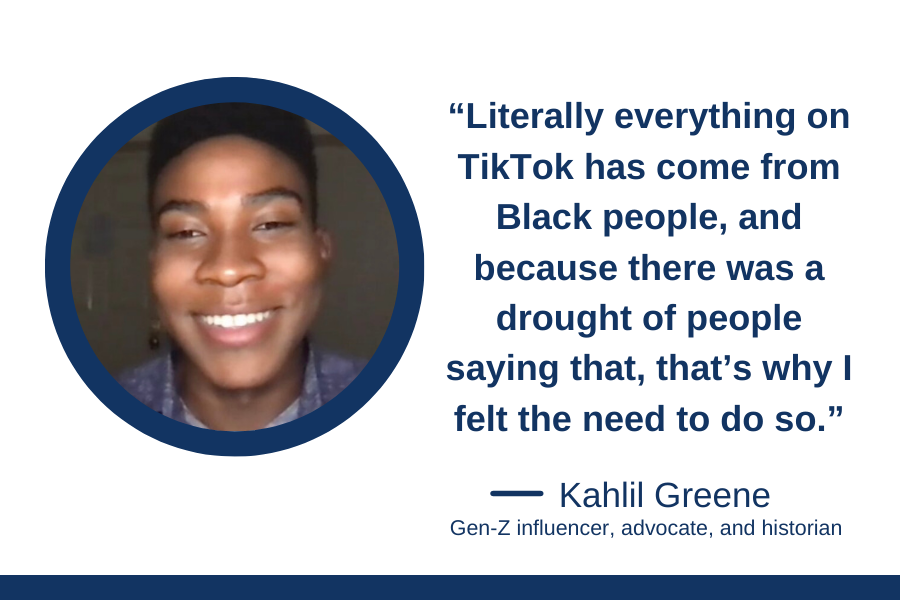Gen-Z historian Kahlil Greene taps TikTok influence to call for changes
Influencer, historian Kahlil Greene urges TikTok changes

“Literally everything on TikTok has come from Black people, and because there was a drought of people saying that, that’s why I felt the need to do so,” Kahlil Greene said at SU’s Leaders in Communication Series event Tuesday. As the first Black student body president at Yale University, a historian, advocate, and now an influencer, Greene answered student and moderator Melissa Chessher’s questions over Zoom.
Chessher started the conversation by highlighting how much love is shared in Greene’s Tik Tok comment section which contrasts with much of the negativity surrounding national conversations about race.
“The history that I’m teaching is stuff in the Black community that has often either been shared aurauly or known or uncovered,” Greene said. “The information itself has existed for a long time, but I think the key is that it’s becoming mainstream now.”
Even with almost 500,000 followers on Tik Tok, Greene said he originally didn’t want to get involved with the platform because of the appropriation that occurred on the app. Greene believes that his first post about the whitewashing of MLK was disruptive, and that’s why it went viral immediately.
“I didn’t want to feel like I was supporting that. But then…there were so many things worth commenting on,” Greene said.
Greene also expressed that he used to be a STEM kid and that debate and argumentation used to scare him. He advised the audience to practice these skills because that’s what helped him grow as a communicator and advocate.
“Get good at debate…The ability to verbalize what your feeling, especially when it relates to injustice, to be able to articulate why something is an issue and what the actual solution should be is what advocacy is,” Greene said.
According to Greene, he prefers the term “advocate” or “public educator” for himself as opposed to “activist.” He said he hopes by using a public platform to reach a larger audience, he will be able to share his perspective and analysis with as many people as possible and encourage change.
“What I see in the world are things that I can’t directly communicate with someone to change, or I think it takes a lot of changing minds and a longer path of educating people before that change can happen,” Greene said.
Greene’s favorite self-made Tik Toks are from his series “How Everything on This App Originates with Black People.” In the series, he explains which Black creators’ trends are appropriated. Throughout his time on the app and creating content, Greene said he has seen small amounts of progress, but noted there are still larger societal issues that occur in the platform.
“Now it’s more normalized or expected that large creators give dance credits to the choreographers for a trend,” Greene said. “There’s an issue that still exists which I highlighted in my most recent post on social media which is that of cultural exploitation. Even when you cite your sources you’re able to benefit from those dances at a rate that Black people aren’t.”
As Yale’s first Black student body president, Greene said “The most difficult part was trying to bring in a new set of values to student government, largely based on my identity as a Black person.”
At the same time, Greene was elected, he said there were protests about racial injustice in the campus community. Greene said he “had to find ways of legitimizing through argument and reason why it was necessary and a part of our mission and constitution to get involved in those types of things.”
To end the talk, Greene stressed the importance of supporting content creators on social media. He also noted the power that platforms have to curtail the spread of information and ideas, and that individuals need to support each other to progress and make change.
“Everyone needs to invest and support creators across platforms,” Greene said. “As you saw yesterday Instagram, Facebook, and What’s App can go away at any moment…so we’re really at the mercy of platforms and as soon as those platforms don’t want the information to be shared, it goes back to however many years ago that you couldn’t get a platform this fast and big.”








